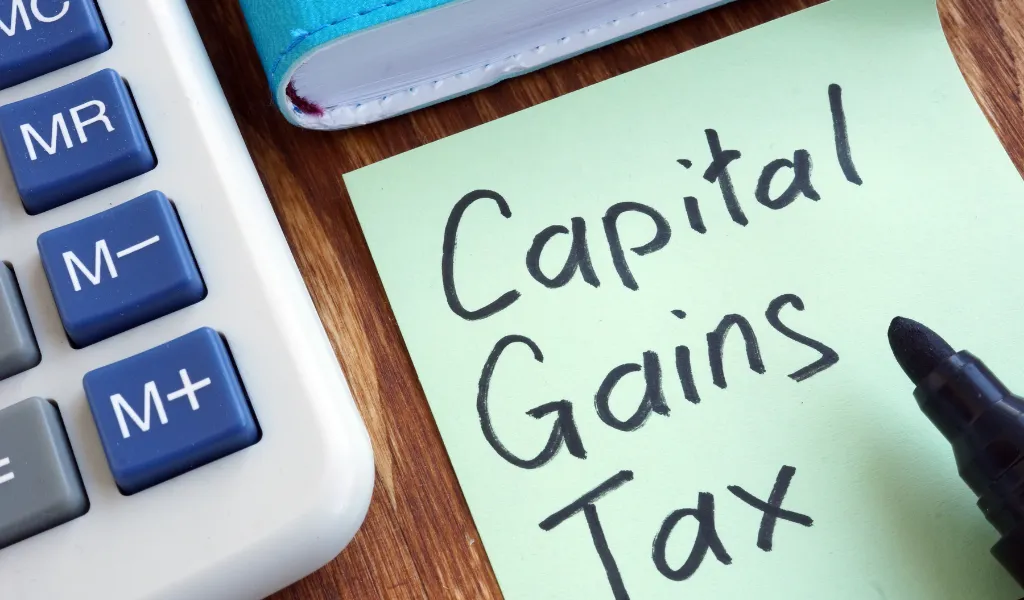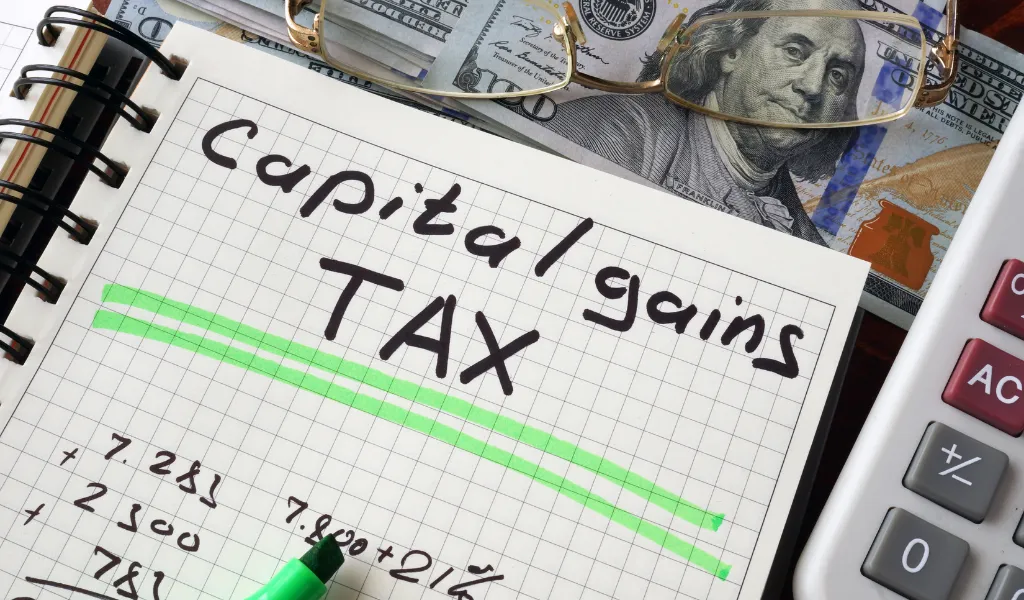Undoubtedly, tax implications are complex. When it comes to declaring your Capital Gains Tax (CGT) for HMRC, you must know how to proceed. Also, you should know there are consequences if you fail to do so. Correctly reporting your Capital Gains Tax (CGT) and losses is important. There are certain exemptions and ways to reduce your CGT bill. This guide will cover all that and more. Most importantly, it will answer the question: how does HMRC know about Capital Gains Tax (CGT)?
First, let’s discuss what is Capital Gains Tax (CGT) and how to calculate it. Then, we can discuss when you owe CGT.
What is Capital Gains Tax?
A tax charge that is applicable on the gain from the sale of something you own is called Capital Gains Tax (CGT). You calculate it from the profit made. The profit is equal to the increase in the value of the sale price in comparison to the purchase price. This is for an asset that you held for more than one year.
Usually, CGT applies to the following:
- Secondary residences.
- Property inheritance.
- The sale of a company.
- Shares.
- Investment funds.
- Precious items, including artwork, jewels, and antiques.
- Assets that transferred for less than their market value.
Currently, different rates apply to the Capital Gains Tax (CGT) on these assets than those of income tax. The reason for this is that buying these types of assets is risky. Therefore, there is a greater potential reward for the additional burden of risk.

How Does Capital Gains Tax (CGT) Work?
CGT is not like income tax. This means that there is no automatic deduction by the inland revenue. You must report it yourself. There are plenty of fiscal triggers. Therefore, you should know what is necessary to report. In case you do not provide correct reports, then you will end up paying a fine. This fine can go above the deduction.
How Much is Capital Gains Tax (CGT) in the UK?
The amount you owe on your Capital Gains Tax (CGT) is dependent on the type of assets you are selling and your tax status. Every individual has an allowance of £6,000 for the 2023/2024 tax year. This amount is deducted from any gain you make. This means that you pay tax on any amount above it.
Please note that it is not possible to carry the allowance forward into the next tax year. Therefore, you should use it for your gains if you can each year. Furthermore, you should consider how disposing of your assets works best for you presently as compared to the future. Look at it from a tax perspective. It is also important to note that the CGT allowance is going to decrease again on 6 April 2024. It will once again reduce to £3,000.
You can find plenty of useful calculators online. However, HMRC breaks down the calculation of CGT into five major steps:
- Figure out your taxable income.
- Calculate your gain.
- Deduct the tax-free allowance of £6,000 from the total amount of gain you made.
- Add the amount of gain minus the allowance to your taxable income.
- The total amount can fall within the basic tax band or within the additional rate taxpayer band. Below is a table indicating how much you owe in each case.
| Tax Band 2023/2024 | CGT on Residential Property | CGT on Other Assets |
|---|---|---|
| Annual allowance Gains up to £6,000 | 0% | 0% |
| Basic rate taxpayer £12,571 – £50,270 | 18% | 10% |
| Higher/additional rate taxpayer £50,271 + | 28% | 20% |
How Does HMRC Know About Capital Gains Tax (CGT)?
You must report your Capital Gains Tax (CGT) on a Self-Assessment tax return. You can do so by using the Capital Gains Tax (CGT) pages. Moreover, you can find the specific pages on GOV. UK if you submit a paper tax return.
It is necessary to use these pages if:
- The gains you made are more than the annual allowance of £6,000.
- Your sales proceeds exceed the threshold of £50,000. It does not matter if your gains are less than the annual allowance.
Nevertheless, there is no need to complete the Capital Gains Tax (CGT) pages if your disposal is just from your home. That is, if the PPR applies on the amount of your gain.
Suppose you make a disposal of UK land and property. Then, reporting the disposal of the property to HMRC on a separate return can be necessary. You will need to pay CGT within 60 days of the date of completion. Then, how does HMRC know about Capital Gains Tax (CGT)?
This kind of return is not necessary if the deadline falls after disclosing the disposal on a Self-Assessment tax return. Suppose 28 March 2023 is the completion date for your property disposal. If by 27 May 2023, you file your Self-Assessment tax return, then the 60-day rule does not apply. Instead, 31 January 2024 is the deadline for CGT in this case. Generally, they waive the 60-day deadline requirement if it occurs after the deadline of the tax return. This is the tax return which should report the disposal. For example, you exchange contracts at the end of the tax year. However, the completion did not take place until January next year.
Exception:
It is important to note that there is an exception to the two rules. This applies if the amount of CGT you report in your tax return is less than the amount which would have been due within 60 days.
To explain this, let’s look at an example:
28 March 2023 is the completion date for your property disposal. Your Capital Gains Tax (CGT) is £5,000 after deducting the annual allowance. However, you make a loss of £7,000 on the disposal of shares on 2 April 2023. Here, you cannot deduct the capital loss as it is after the completion date. You can offset the loss from the gain when you file your tax return. If there are no other capital disposals in the tax year, then 27 May 2023 is your CGT deadline. You should file a 60-day return and pay CGT by this date. Claiming relief for capital loss requires waiting to file your Self-Assessment tax return.
Even if you do not owe tax as a non-resident making disposal, you should report it within 60 days. This not only applies to the disposal of residential property by non-residents, but all UK land and property. If you do owe tax, then you should also pay it within those 60 days. You can find information regarding this on GOV. UK.
For UK residents disposing of UK residential property, it is also necessary to report it within 60 days. Unless, of course, you do not owe tax. In case you do need to pay tax, it is also due within those 60 days.
Even if you plan to file a Self-Assessment tax return for the year later, you need to report your disposals within 60 days.
Example of Capital Gains Tax (CGT):
Let’s look at an example:
Suppose your taxable income is £30,000. This is your income minus your personal allowance and any income tax reliefs. Then you inherit shares from your uncle and sell them for £45,000. At the time of receiving this inheritance, they were worth just £24,000. Therefore, you make a total gain of £21,000. So, how does HMRC know about Capital Gains Tax (CGT)?
When you calculate how much you need to pay, you deduct the tax-free allowance from your gain first. So, if you deduct £6,000 from £21,000, then you have £15,000 of additional taxable income. You must add this amount to your taxable income. This makes £45,000. This means that you are within the bracket of basic rate band (£50,270 for 23/24). Thus, you owe 10% on the whole gain.
Do You Need to Pay Capital Gains Tax (CGT) on Profits from Selling Your Home?
Under the Principal Private Residence (PPR) relief, your primary home is exempt from CGT. In case you have two homes, you can elect one as your primary residence. Election is an HMRC form. HMRC will not accept that a holiday home is your principal home, as you only spend a few weeks there. If you are married, then you can only count one home as your principal home at any one time.
Does Capital Gains Tax (CGT) Apply on the Sale of a Residential Property?
When you sell a rental property, you can make use of various exemptions. You can receive full relief for the number of years you resided in the home. That is, for however long, it was your primary residence. This includes the last nine months you were the owner of the home. It does not matter if you were living there or not during that time. Until 2020, this period was of 18 months.
Moreover, you can deduct several expenses. For example, the costs of selling, purchasing, or even improving your home. This covers the following:
- Solicitor and estate agent fees.
- Costs of improvement such as a new kitchen, bathroom, windows, and extension. Please note that normal maintenance costs do not count. For example, repairs or paint.
When is the Due Date for Capital Gains Tax (CGT)?
If you made a Capital Gains Tax (CGT) on your property, you had 22 months to pay your CGT bill. This was the rule until 2020. Now, you only have one month to pay for the disposal or sale of your property. You must submit a residential property return. Furthermore, you should make your payment on account within a month. Therefore, you must get things in order when selling a holiday home or buy to let property.
You have more time to make your tax payment for all other assets. By 31 December in the tax year after you made your gain, you must report it. Suppose you sell shares in February 2022. Then, by 31 December 2022, you must report this. After this, you will receive an email or a letter from HMRC. This will include a payment reference number and explain how to pay.
Exemption from Capital Gains Tax (CGT) on Certain Assets
The good news is that various assets are exempt from Capital Gains Tax. You can give as much as you want to your spouse, partner, or even a charity without facing Capital Gains Tax (CGT). When it comes to tax-planning, this is a useful device. Following are the assets that are exempt from CGT:
- Private automobiles, including vintage vehicles.
- Assets kept in a pension fund or ISA.
- Premium Bonds and gilts issued by the UK government.
- Cash
- Winning pools, lotteries, and betting.
- Foreign cash that you keep on hand for personal purposes.
- Personal property (sometimes known as “chattels”) for which the sale earnings are less than £6,000.
How Can You Minimise Your Capital Gains Tax Liability?
When saving tax on Capital Gains Tax (CGT), you must consider quite a few things. Please note that it is best to get help from a financial adviser. Here are ways to reduce your Capital Gains Tax (CGT) bill:
- By transferring to your partner, you both can benefit from your full pre-tax allowance.
- Using your CGT allowance.
- By declaring any losses to HMRC. They will offset your gains to give a revised contribution amount.
- Selling your principal home. If you meet certain conditions, then you do not need to pay for CGT. This is called Principal Private Residence (PPR) relief. For example, a couple is going through divorce. One of them is leaving the family home and going to live elsewhere. They are doing so before selling the family home, which is now a secondary home.
- Remaining informed about your wasted assets. These are the assets whose life is less than 50 years. For example, vintage cars, caravans, or antique clocks.
- By investing your money in ISAs or EIS. They both provide a free of tax property for your savings.
- Donating to charity. Income and CGT relief are available if you donate land, property, or shares to charity.
- Contributing to a pension. By doing so, your CGT bracket changes. As a result, you pay less.
- Staying organised. You must know about your taxable assets and your allowance. Also, you should know that how and when you pay CGT affects how much you must pay.
- In case both you and your spouse or civil partner use your annual CGT allowance, the one with the lowest marginal rate of tax should sell the assets.
Conclusion
To conclude, it is important to declare your Capital Gains Tax (CGT) for HMRC. If you fail to do so, it can lead to you paying more than you would otherwise. When filing your report, make sure you are stating your gains and losses correctly. You have an annual allowance of 6,000 in 2023/2024. Tax applies to the amount above it. There are ways to reduce the CGT bill you owe. Make sure you are aware of them. Furthermore, there are exemptions on certain assets. The amount of CGT you owe depends on your tax status and the type of assets you are selling. Make sure to check your taxpayer band and see which one you fall under.








